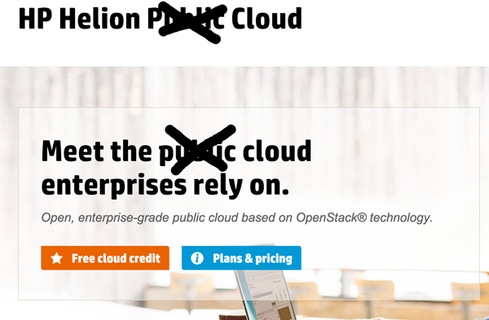Rather than challenge Amazon, Google, and Microsoft as a cloud computing provider, HP has decided to focus on competitions it can win.


10 Linux Distros You Need To Know
10 Linux Distros You Need To Know (Click image for larger view and slideshow.)
[Editor’s Note: This article was updated at 1:13 p.m. ET on April 10.]
As HP works on dividing itself into two companies, it seems to be of two minds about its commitment to providing cloud computing services.
On Tuesday, Bill Hilf, HP SVP of cloud product management, told The New York Times that "it makes no sense for us to go head-to-head" with the likes of Amazon, Google, and Microsoft in the battle to sell on-demand computing to businesses.
Yet the following day HP issued a statement to ComputerWeekly saying what sounds like the opposite. "HP is not leaving the public cloud market," the company said. "We run the largest OpenStack technology-based public cloud in the US. This has to do with not competing head-to-head with the big public cloud players."
HP did not immediately respond to a request for comment. But the company's disappointing revenue – $26.8 billion, down 5% in Q1 year-over-year – suggests why it might move away from the thin margins of the public cloud.
In October 2014, when HP discussed its intention to self-divide, the company said its Hewlett-Packard Enterprise offshoot would build upon a foundation of enterprise hardware, services, software, and its OpenStack Helion cloud platform.
Helion provides public, private, and managed cloud service, but it's the company's private cloud implementations that merited mention by HP CEO Meg Whitman during the company's Q1 2015 investor call. She highlighted HP Enterprise's engagement with delivery firm TNT, which involves "consolidating and virtualizing its IT infrastructure and moving some functions to an HP Helion managed virtual private cloud environment." She also pointed to research firms Forrester and IDC recognizing Helion private cloud services in China and HP's US government private cloud.
Without the scale of Amazon, Google, or Microsoft, HP can't really compete as a public cloud provider. The big companies have cut prices to the bone.
HP could have tried to compete by making an acquisition, as IBM has done with SoftLayer, but the company has opted to look elsewhere for profits. It signaled its intention to focus on more lucrative aspects of the cloud business last year when it bought Eucalyptus, which provides tools for building private clouds that work with Amazon's APIs. It will still be dealing with clients who have a presence in the public cloud, but it wants to engage with those clients in other ways.
"HP is outsourcing the public cloud for hyperscale computing," said Lauren Nelson, an analyst with Forrester Research, in a phone interview. In a follow-up call, she stressed that HP is not exiting the public cloud market completely.
Nelson said that Dell did as much two years ago and struggled with market perception after that. And Rackspace backed away from pure infrastructure-as-a-service last year.
Nelson said HP is struggling to tell its story as it steps back. She also noted that the OpenStack Foundation, which oversees the OpenStack open source cloud computing software platform, may face questions about the positioning of its public cloud, "if HP does minimize or eliminate its public cloud services, given that the promise is future portability and less vendor lock in."
In an email that arrived after this story was filed, Mark Collier, COO, OpenStack Foundation, said that, HP's plans aside, he sees the ecosystem evolving product lines to serve customers, with different delivery models suited to the markets they address. He pointed to numerous public clouds around the world running OpenStack.
He also said the market is adopting OpenStack for specific applications. "Enterprises and service providers with specific problems to solve are embracing OpenStack in private and hybrid scenarios because it gives them either a heightened degree of control over the infrastructure, or because vendors are offering compelling services running atop OpenStack," he said, noting that the shifts made by early supporters of OpenStack reflect what their customers say about how they want to employ OpenStack as part of their cloud portfolio.
Collier said that the OpenStack community includes hundreds of vendors beyond Rackspace.
"With regard to interoperability, we're making a big push in that direction, introducing interop testing of all 'Openstack Powered' products this year (this includes both public and private clouds to ensure interop between them)," said Collier. "We’re also updating the way we organize all of the OpenStack projects, starting with a tightly defined core for interoperability, while better describing the many optional components that rely on that core according to the specific application use cases they’re built to serve."
Attend Interop Las Vegas, the leading independent technology conference and expo series designed to inspire, inform, and connect the world's IT community. In 2015, look for all new programs, networking opportunities, and classes that will help you set your organization’s IT action plan. It happens April 27 to May 1. Register with Discount Code MPOIWK for $200 off Total Access & Conference Passes.
About the Author(s)
You May Also Like







